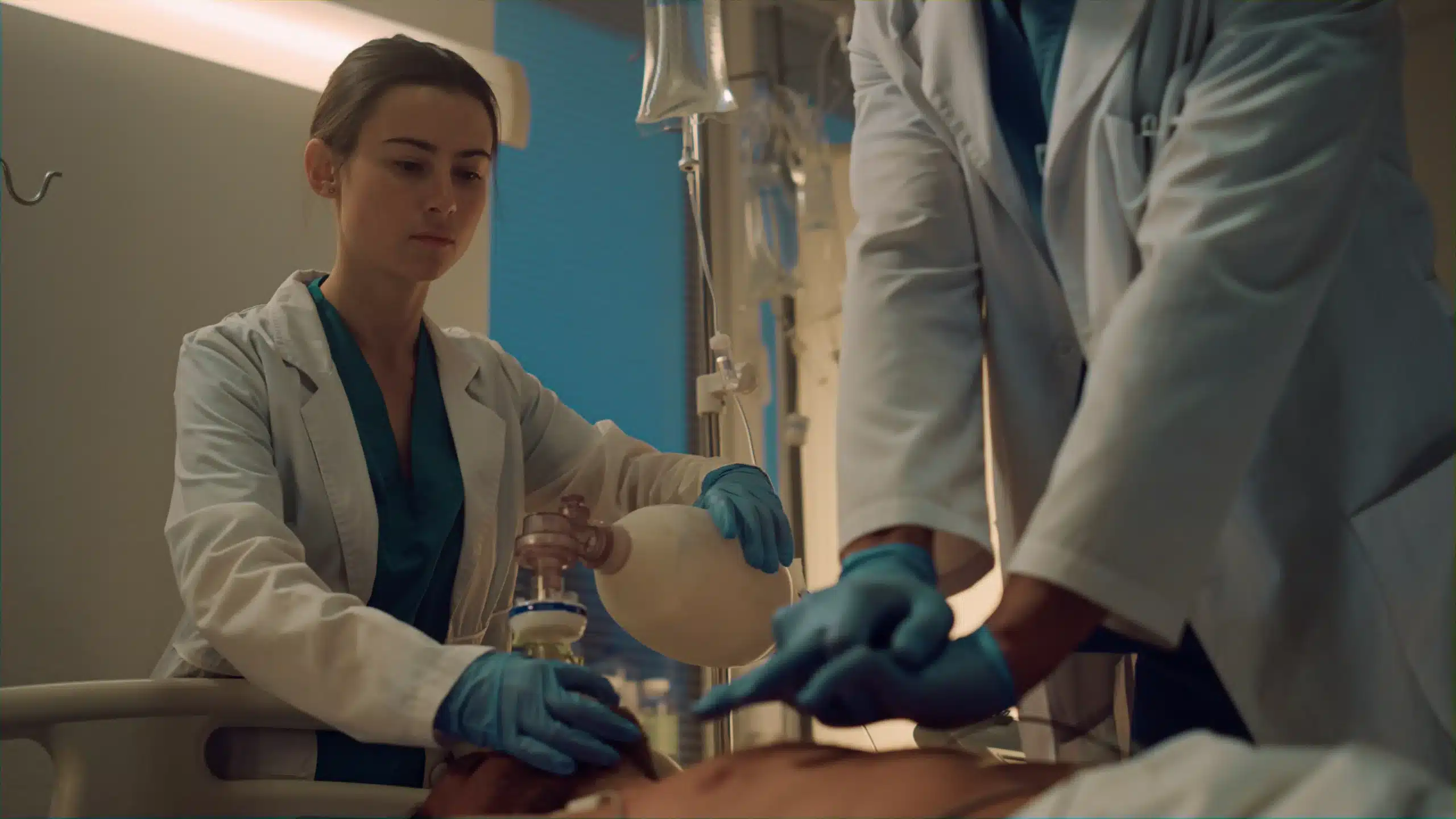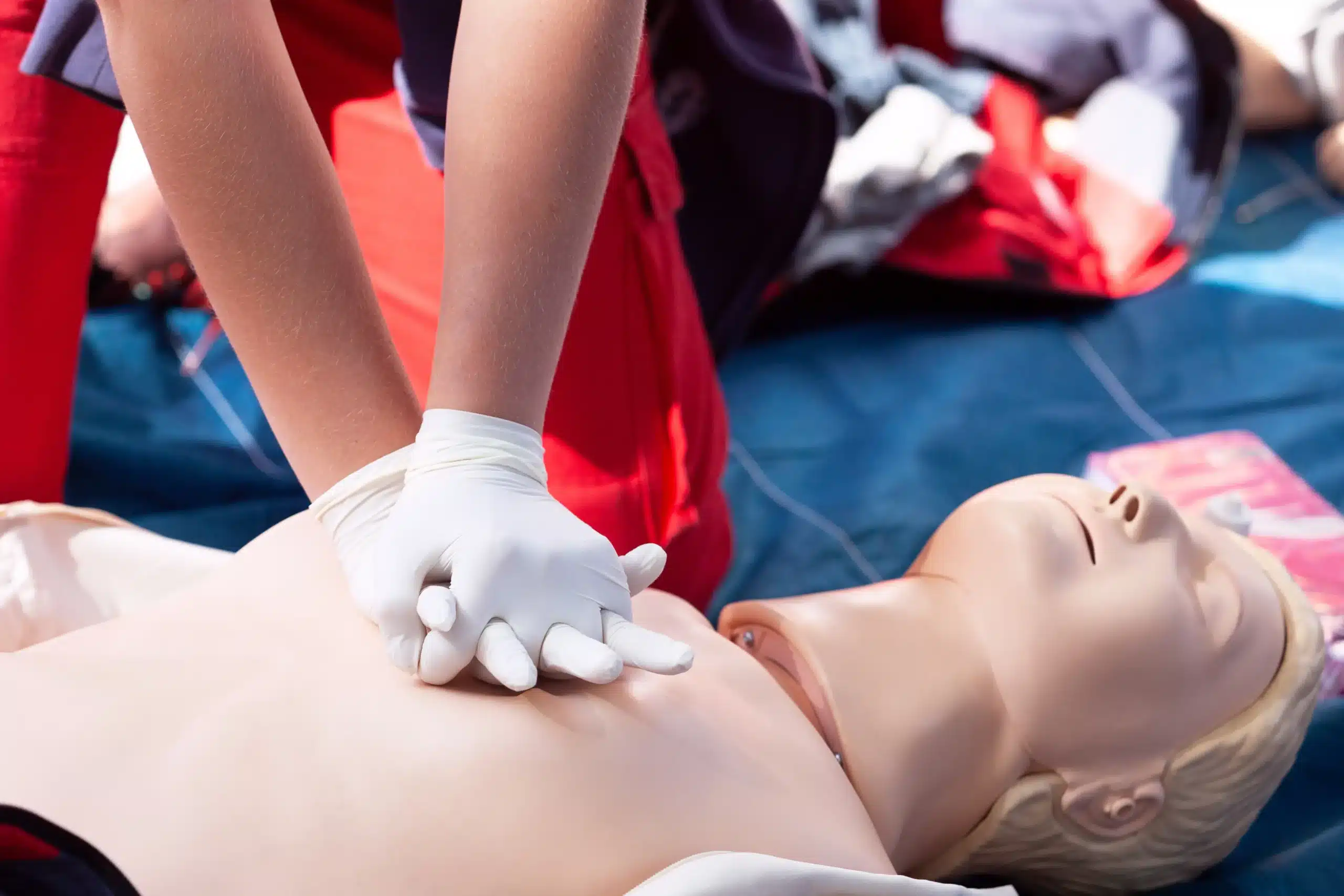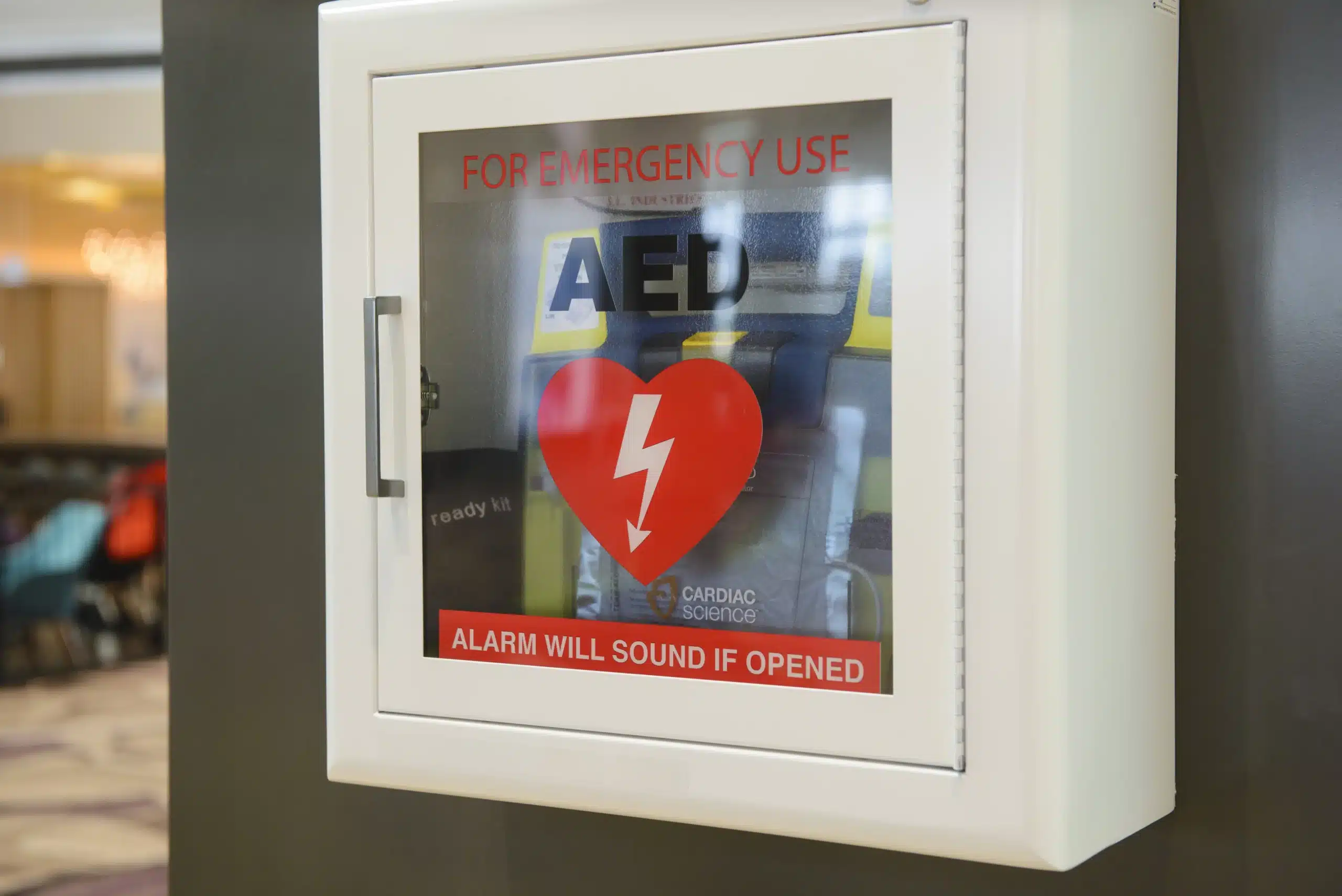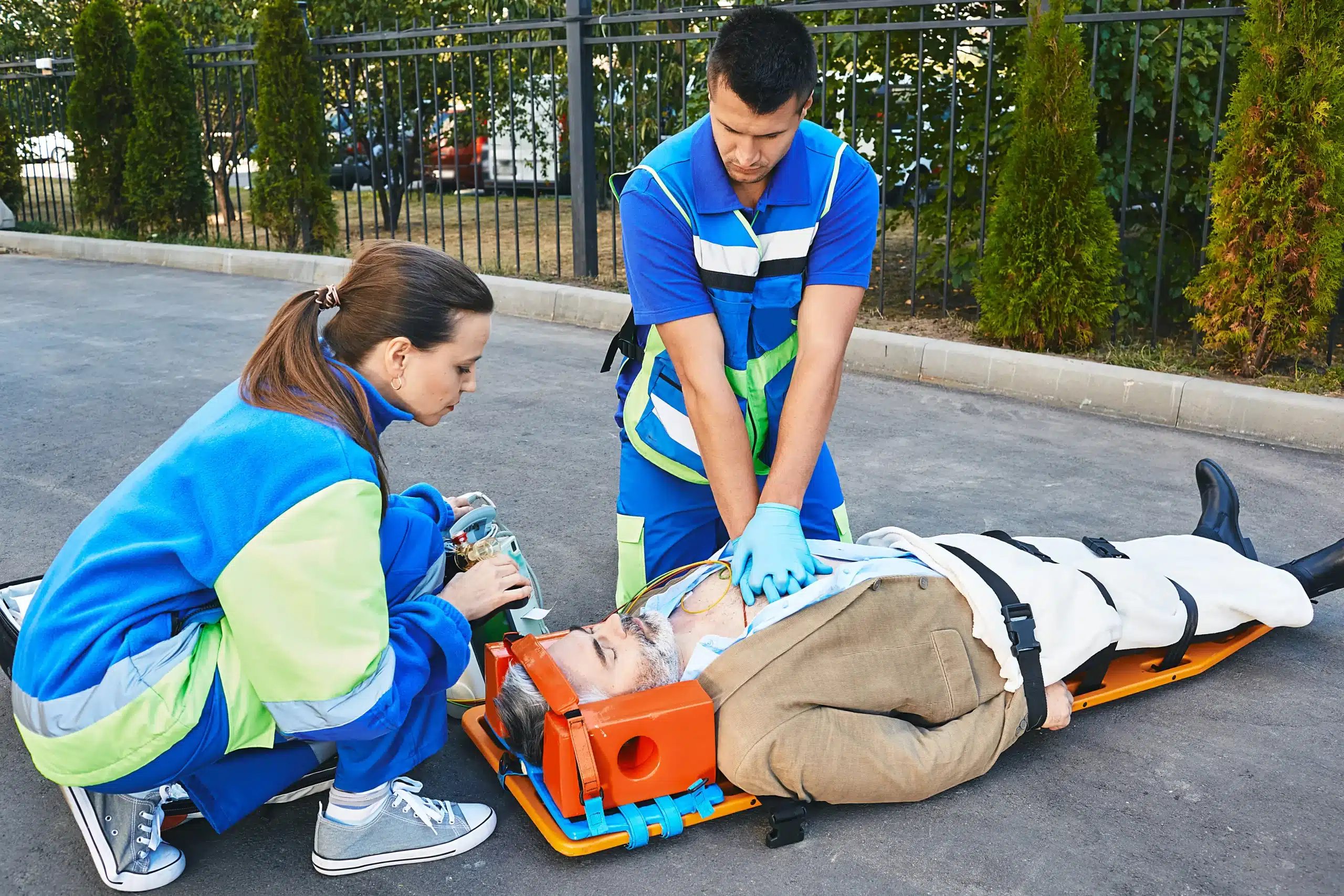As a parent or caregiver, the safety of children is always top of mind. Knowing how to respond in a medical emergency can make all the difference. Pediatric Advanced Life Support (PALS) training provides healthcare professionals, childcare providers, and even parents in San Mateo with the advanced skills to handle critical situations involving infants and children. This comprehensive training goes beyond basic CPR, equipping you with the knowledge and techniques to address a range of pediatric emergencies. This article will explore the ins and outs of PALS, from understanding the core curriculum to finding the right training program in San Mateo. We’ll also discuss the benefits of PALS certification and how it can enhance your career prospects. If you’re looking to gain confidence and competence in pediatric advanced life support in San Mateo, this guide is for you.
Key Takeaways
- PALS certification equips you with essential skills: It goes beyond basic life support, giving you the confidence to handle pediatric emergencies effectively. This specialized training can significantly improve patient care and outcomes.
- Choosing the right PALS course matters: Consider factors like location, schedule, and course format (online, blended, or in-person) when selecting a provider in San Mateo. Look for AHA-certified training centers with experienced instructors and positive reviews.
- Maintaining your PALS certification is crucial: Stay current with the latest guidelines by renewing your certification every two years and pursuing continuing education opportunities. This ongoing commitment ensures you’re always prepared to provide the best possible care.
What is PALS?
Pediatric Advanced Life Support (PALS) is a specialized emergency protocol designed for life-threatening medical emergencies in children under 18. It’s a vital system that equips healthcare providers with the knowledge and skills to act effectively in critical situations. PALS builds upon the foundation of basic life support (BLS) with a focused approach to the distinct needs of infants and children. For more on BLS, visit our BLS certification page.
Key PALS Training Components
PALS training covers essential skills, including recognizing and treating respiratory emergencies, shock, and cardiac arrest. The curriculum emphasizes a systematic approach to pediatric assessment, allowing providers to quickly identify and address critical conditions. It also includes effective resuscitation techniques and medication administration tailored to pediatric patients. Many courses use a blended learning format, combining online modules with in-person skills sessions. Consider exploring our CPR and First Aid certification courses to complement your PALS training.
Why Healthcare Providers Need PALS
PALS certification is essential for healthcare professionals who work with children. It equips providers with advanced skills beyond basic life support, enabling them to manage complex pediatric emergencies confidently. This specialized training enhances patient care and can significantly improve outcomes in critical situations. For healthcare providers, PALS certification demonstrates a commitment to providing the highest standard of care for young patients. Learn more about our affordable training options and our low price guarantee. We also offer RQI programs for healthcare professionals looking to refresh and maintain their resuscitation skills.
PALS Certification Requirements in San Mateo
This section covers the requirements for PALS certification in San Mateo, including prerequisites and the certification process. Understanding these aspects will help you prepare for your PALS course and ensure a smooth certification journey.
Enrollment Prerequisites
Before enrolling in a Pediatric Advanced Life Support (PALS) course in San Mateo, you’ll typically need a current Basic Life Support (BLS) certification. This prerequisite ensures you already have fundamental skills in CPR and basic life support techniques. It’s like building a strong foundation before adding more advanced knowledge. You can find BLS certification courses on the San Mateo CPR Courses website.
Certification Process & Duration
The PALS certification process involves comprehensive training, equipping you with the skills and knowledge to manage pediatric emergencies. This training includes lectures, interactive discussions, simulations, and hands-on practice. After successfully completing the course, including a written exam and skills demonstration, you’ll receive your PALS certification card. This PALS certification is valid for two years. To maintain your certification, you’ll need to complete a recertification course before it expires, keeping your skills and knowledge current with the latest guidelines in pediatric emergency care.
PALS Course Content & Structure
PALS certification is crucial for healthcare providers facing life-threatening emergencies in children. It goes beyond basic life support (BLS), equipping you to handle critical pediatric situations. Understanding the course content and structure will help you prepare for this training.
Core Curriculum Topics
The PALS curriculum covers essential topics like respiratory emergencies, shock, cardiac arrest, and post-resuscitation care. You’ll learn systematic assessment and treatment algorithms, recognizing and managing deteriorating conditions, and effective team dynamics during emergencies. The course emphasizes early intervention and high-quality CPR for better patient outcomes. For more insights, check out our blog post on Pediatric Advanced Life Support (PALS) Training.
Hands-on Training
PALS courses typically use a blended learning format, combining online modules with in-person skills sessions. This lets you learn theory at your own pace, then practice essential skills in a supervised setting. These hands-on sessions are crucial for mastering techniques like intubation, vascular access, and medication administration. You’ll usually need a current BLS certification before starting PALS.
Blended Learning Options
HeartCode PALS offers a flexible blended learning solution, combining online modules with in-person skills practice. This allows you to complete the cognitive part online and then demonstrate your skills in person. This blended approach is convenient and efficient, especially for busy professionals. HeartCode PALS is a valuable option for renewing or obtaining PALS certification.
Find PALS Courses in San Mateo
Finding the right PALS course in San Mateo requires understanding your options. Let’s explore some of the leading providers and training formats available.
Safety Training Seminars
Safety Training Seminars offers PALS certification among its comprehensive suite of courses. As a woman-owned AHA Training Center, they prioritize high-quality instruction and convenient scheduling. They offer courses seven days a week, catering to busy professionals and diverse schedules. Their commitment to customer service and low price guarantee makes them a popular choice for healthcare providers in San Mateo, Daly City, and Millbrae. You can find more information about their BLS, ACLS, and combined CPR and First Aid courses on their website.
American Heart Association (AHA)
While the AHA doesn’t directly conduct courses, they set the standards for PALS training. Look for AHA-certified training centers like Safety Training Seminars to ensure you receive instruction aligned with the latest guidelines. The AHA’s RQI program (Resuscitation Quality Improvement) is a particularly popular option for healthcare professionals seeking BLS, ACLS, and PALS certification. RQI offers a blended learning approach, combining online modules with in-person skills sessions.
Cascade Healthcare Services, LLC
Cascade Healthcare Services, LLC, is another provider offering PALS training in San Mateo. Check their website for their most up-to-date course schedule and availability.
Online & In-Person Options
PALS courses are offered in various formats to suit different learning styles and schedules. Traditional in-person classes provide hands-on training and direct interaction with instructors. Blended learning options like HeartCode PALS combine online modules with in-person skills practice, offering flexibility and convenience. HeartCode PALS allows you to complete the cognitive portion of the course at your own pace before attending a hands-on skills session. When choosing between online and in-person options, consider your learning preferences and time constraints.
PALS Certification Cost in San Mateo
Knowing the cost of PALS certification in San Mateo helps you budget effectively. Let’s break down typical price ranges, factors influencing cost, and ways to find the best value.
Typical Price Ranges
PALS certification costs in San Mateo vary based on several factors, including the training center, course format (online or in-person), and included materials. While it’s tough to give an exact number, being aware of the general range can help you prepare. Safety Training Seminars offers competitive pricing and a low-price guarantee for PALS certification in San Mateo County. Contacting them directly for a quote is the best way to get an accurate price.
Factors Affecting Course Prices
Several elements contribute to the overall cost of a PALS course. The course format, whether a blended learning approach with online modules and in-person skills sessions or entirely in-person, influences pricing. Materials, such as textbooks or online resources, may be included or come at an additional cost. Most PALS courses require a current BLS certification, so factor that cost in if you need to renew or obtain it. Safety Training Seminars offers more information on their course structure.
Low Price Guarantee Options
Finding a balance between quality training and affordability is essential. Safety Training Seminars offers a low-price guarantee, ensuring you receive excellent PALS instruction at a competitive price. Their commitment to small class sizes provides personalized attention from experienced instructors, maximizing your learning. As a woman-owned AHA Training Center, they provide high-quality, American Heart Association-approved courses. This commitment to quality and affordability makes them an excellent choice for healthcare professionals seeking PALS certification in San Mateo, Daly City, and Millbrae.
Benefits of PALS Certification
Earning your PALS certification offers significant advantages, from improving patient outcomes to boosting your career prospects. Let’s explore some key benefits:
Enhanced Patient Care
PALS certification equips healthcare providers with the advanced skills to respond effectively to pediatric emergencies. It goes beyond basic life support (BLS) training, covering specialized techniques for assessing and managing life-threatening situations in infants and children. This specialized knowledge translates to improved patient care and better outcomes during critical moments. As highlighted by San Mateo CPR Classes, PALS certification is crucial for providers handling these emergencies.
Career Advancement
In a competitive healthcare landscape, PALS certification can be a significant advantage. It demonstrates a commitment to advanced training and specialized knowledge in pediatric care, which can open doors to new opportunities. AHA certifications, like PALS, are highly regarded and strengthen your credentials, making you a more competitive candidate. Whether you’re a nurse, doctor, or other healthcare professional, PALS certification can set you apart.
Confidence in Pediatric Emergencies
Facing a pediatric emergency can be incredibly stressful, but PALS training provides the tools and knowledge to manage these situations with confidence. The curriculum covers essential skills, from airway management and vascular access to recognizing and treating respiratory issues. PALS training empowers providers to assess, stabilize, and treat young patients, fostering a sense of calm in high-pressure scenarios. This increased confidence benefits both the provider and the patient.
Prepare for Your PALS Course
Getting ready for your PALS certification involves more than just showing up on the day of the course. A little prep work goes a long way in ensuring you’re confident and ready to learn. This section covers the essentials to help you succeed.
Study Materials & Resources
Effective preparation starts with the right resources. The HeartCode PALS program offers a blended learning approach, combining online modules with in-person skills practice. This flexible format lets you learn at your own pace and still get that crucial hands-on training. Many training centers in and around San Mateo offer PALS certification courses, including Millbrae CPR Classes, Heart Start CPR, Cascade Training Center, and the Emergency & Health Training Center. Researching these options can help you find a course that fits your schedule and learning style.
Tips for Success
One of the best ways to prepare for PALS certification is to familiarize yourself with the American Heart Association’s RQI program. RQI (Resuscitation Quality Improvement) is a modern, efficient way for medical professionals to maintain their BLS, ACLS, and PALS certifications. Consider this program as a valuable supplement to your PALS training. Also, think about creating a study schedule that works for you. Breaking down the material into manageable chunks can make the process less daunting.
Common Challenges & Solutions
Many healthcare providers struggle to find time for PALS certification. The blended learning format of HeartCode PALS addresses this by allowing you to complete the online portion at your own convenience, followed by an in-person skills assessment. This helps accommodate busy schedules while still providing comprehensive training. Another common challenge is simply finding the right course. Start by compiling a list of reputable providers in San Mateo offering online and hybrid PALS courses. This streamlines your search and ensures you choose a course that aligns with your needs. If you’re already enrolled in a CPR course in San Mateo, stay informed about any updates or changes related to your upcoming class. Being proactive will help you avoid any last-minute surprises.
Maintain Your PALS Certification
Keeping your PALS skills sharp is crucial for providing the best possible care to young patients. This section covers how to maintain your PALS certification and why continued learning matters.
Renewal Requirements
PALS certification is typically valid for two years. To stay certified, you’ll need to complete a PALS renewal course before your current certification expires. A current Basic Life Support (BLS) certification is often a prerequisite for PALS renewal, so ensure you’re up-to-date on both. Don’t wait until the last minute; planning ahead helps you avoid any lapse in your certification.
Continuing Education
Beyond renewing your certification, ongoing education is key for staying at the top of your game in pediatric advanced life support. Regularly refreshing your skills through continuing education courses can significantly improve your ability to handle pediatric emergencies. Many PALS courses offer continuing education credits, such as CME/CE, which can help healthcare professionals meet their educational requirements while staying current with advancements in pediatric care. These courses often emphasize practical skills and real-world scenarios, making sure you’re prepared for anything.
Choose the Right PALS Provider in San Mateo
So, you’re ready to get your PALS certification—fantastic! Choosing the right provider is a crucial first step. With several options in San Mateo, finding a course that fits your needs and learning style is important. This section will guide you through key factors to consider when making your decision.
Factors to Consider
Think about what matters most to you in a learning environment. Do you thrive in a traditional classroom or prefer the flexibility of online or blended learning? A blended learning format, like HeartCode PALS, allows you to complete some coursework online at your own pace before an in-person skills session. This can be a great option if you’re juggling a busy schedule. Also, consider the course schedule and location. Choose a provider with class times and a location that accommodate your schedule and commute. Safety Training Seminars, for example, offers courses in over 60 cities, making it easier to find a convenient option. Finally, don’t forget about the smaller details—comfortable facilities, accessible parking, and responsive customer service can significantly impact your overall learning experience.
Evaluating Course Quality & Reputation
Not all PALS courses are created equal. Look for providers accredited by reputable organizations like the American Heart Association (AHA). Safety Training Seminars is a woman-owned AHA Training Center, offering high-quality AHA-approved courses, including BLS, ACLS, PALS, CPR, and First Aid. A strong reputation within the healthcare community is another good indicator of quality. Inquire about the instructor’s experience and credentials. Experienced instructors can offer real-world insights and create a more engaging learning environment. Also, check if the provider offers continuing education or refresher courses. This shows a commitment to ongoing learning and professional development.
Reviews & Experiences
One of the best ways to evaluate a PALS provider is by hearing from past students. Check online reviews on platforms like Yelp to understand other students’ experiences. Look for comments about the quality of instruction, helpful staff, and the overall learning environment. For example, positive Yelp reviews often mention the clear instruction and comfortable learning environment at Safety Training Seminars. While cost is a factor, prioritize quality over price. A well-taught PALS course is an investment in your career and your ability to provide excellent patient care. The goal is to gain the knowledge and skills you need to handle pediatric emergencies confidently.
The Future of PALS Training
Emerging Technologies in Pediatric Emergency Care
Technology is transforming how healthcare providers learn and maintain their PALS skills. Online learning platforms offer interactive modules, simulations, and virtual scenarios that create a more engaging learning experience. These tools allow for self-paced study and provide immediate feedback, helping students grasp complex concepts more effectively. This shift towards blended learning, combining online modules with in-person skills practice, offers a more flexible and accessible approach to PALS training. For busy professionals in San Mateo, this means you can complete portions of the coursework from anywhere, fitting it into your schedule more easily.
Advancements in Training
The traditional classroom-based PALS course is evolving. Blended learning programs like HeartCode PALS offer a dynamic approach that caters to different learning styles. You can work through online modules at your own pace, then attend an in-person skills session to practice and demonstrate your proficiency. This combination of online learning and hands-on practice provides a comprehensive learning experience. This flexible format is particularly beneficial for healthcare providers juggling demanding schedules, making it easier to stay up-to-date with their PALS certification. The American Heart Association’s RQI program offers a streamlined path to maintaining certification for BLS, ACLS, and PALS. This innovative approach ensures healthcare providers can maintain their skills and provide the best possible care in pediatric emergencies.
Related Articles
- Pediatric Advanced Life Support (PALS) in Daly City – San Mateo CPR Classes
- Pediatric Advanced Life Support (PALS) Training in Millbrae – San Mateo CPR Classes
- PALS HeartCode in Daly City: Your Complete Guide – San Mateo CPR Classes
- HeartCode PALS San Mateo: Your Guide to Certification – San Mateo CPR Classes
- Online PALS Classes in San Mateo: Your Guide – San Mateo CPR Classes
Frequently Asked Questions
What is the difference between PALS and BLS? BLS (Basic Life Support) teaches the fundamentals of CPR and first aid, while PALS (Pediatric Advanced Life Support) builds upon those skills with specialized training for pediatric emergencies. PALS focuses on the specific needs of infants and children, covering advanced techniques like airway management and vascular access. Think of BLS as the foundation and PALS as the next level of expertise for healthcare providers.
How long is PALS certification valid, and how do I renew it? PALS certification is typically valid for two years. To renew, you’ll need to complete a PALS recertification course before your current certification expires. This ensures your skills and knowledge are up-to-date with the latest guidelines in pediatric emergency care. Many providers offer recertification courses, so finding one that fits your schedule shouldn’t be difficult. Often, a current BLS certification is a prerequisite for PALS renewal, so make sure you’re current on both.
What does a PALS course typically cover? A PALS course covers a range of topics essential for managing pediatric emergencies. You’ll learn about systematic assessment, effective resuscitation techniques, and medication administration tailored to young patients. The curriculum also delves into specific emergencies like respiratory distress, shock, and cardiac arrest. Hands-on practice and simulations are a key part of the training, allowing you to apply your knowledge in a safe learning environment.
How much does PALS certification cost in San Mateo? The cost of PALS certification varies depending on the training center, course format (online, blended, or in-person), and included materials. It’s always best to contact providers directly for a quote. Some providers, like Safety Training Seminars, offer a low-price guarantee, ensuring you receive high-quality training at a competitive rate. When comparing prices, consider the value you’re getting—look for experienced instructors, comprehensive materials, and a reputable training center.
What are the benefits of getting PALS certified? PALS certification significantly enhances your ability to provide high-quality care to infants and children during medical emergencies. It equips you with advanced skills and knowledge beyond basic life support, increasing your confidence in critical situations. This specialized training can also boost your career prospects, demonstrating your commitment to pediatric care and making you a more competitive candidate in the healthcare field. Beyond the professional advantages, PALS certification provides the peace of mind that comes with knowing you’re prepared to handle emergencies effectively.






